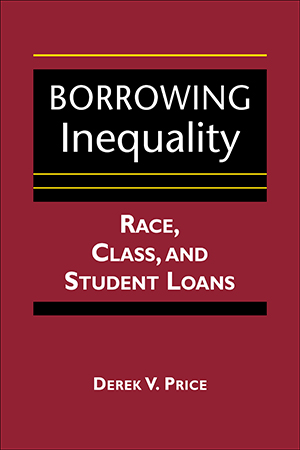Derek V. Price
As the cost of higher education continues to rise, students increasingly rely on borrowing to pay for college. But is the result the improved socioeconomic position that they anticipate? Borrowing Inequality explores the real impact of loans on minority and low-income students.
Drawing on a national study of student-borrowing patterns, Derek Price finds that racial and ethnic minorities and low-income students are not only more likely to borrow than their white and upper-income peers, they also are less likely to graduate from high-status institutions and go on to graduate school. In addition, current loan programs so burden student borrowers that their career opportunities are restricted, in effect perpetuating the very patterns of inequality that the programs were intended to alleviate. While the graduates' prospects clearly are higher than they would have been without higher education, the structural pattern of inequality continues to reflect race, ethnic, gender, and class characteristics.
Price concludes with provocative proposals for aid policies that would expand the range of college and career choices for students—policies that would in fact support the role of higher education as a vehicle for individual opportunity and social change.
Derek V. Price is the director for higher education research at the Lumina Foundation for Education.
"A good introduction to the current state of student borrowing for higher education."—Donald E. Heller, Review of Higher Education
"Borrowing Inequality ... adds a needed and informed voice to the discourse on the prupose and role of higher education.... A readable, thoughtful, and well-argued text, contributing much needed analysis to the equity debate.... Borrowing Inequality provides a sobering look at the current racial and economic barriers to a college degree for many students of color in the U.S., while still holding out for the greater promise of higher education."—Noel S. Anderson, Teachers College Record
"Provides concrete examples of another way in which social inequality is reproduced. Price's suggested reforms are thought provoking and deserve widespread attention."—Karolyn Tyson, University of North Carolina, Chapel Hill
"Price presents an interesting paradox. While educational attainment is held out as a means to social mobility, the social mobility of an entire generation is impeded by the debt associated with obtaining an education."—Ingrid Phillips Whitaker, Old Dominion University








